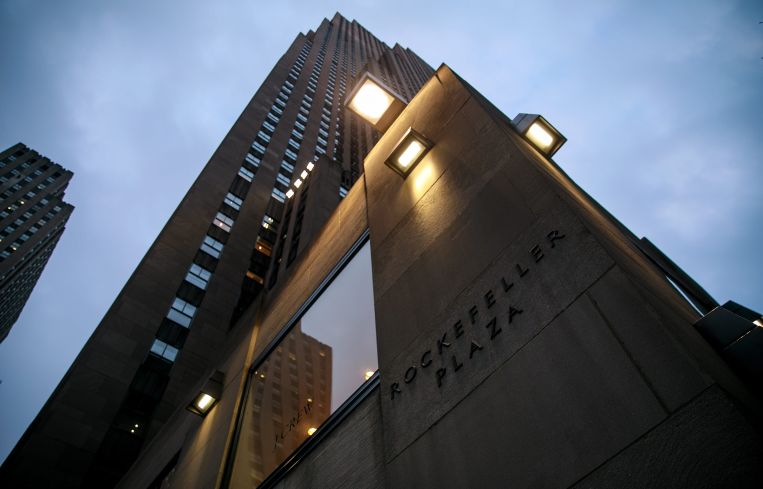Landlords See Enhanced Food Options as Ingredient for Office Rebound
Good-bye, in-house cafeteria — hello, touchless delivery
By David M. Levitt January 19, 2021 7:23 am
reprints
In Denver, a tenant who signed a lease recently for space in an office complex sought a termination provision that allowed the company out of its commitment if a food hall was not provided by a certain date, according to a broker who asked not to be identified.
It’s an unusual demand, but getting less so every day. Office landlords are obsessed with making sure they can keep tenants whose employees have via the pandemic discovered the wonders of working from home, and they want to lure them back any way possible—and food is one of those ways.
For Tom Larance of the brokerage JLL and other commercial real estate experts, the pandemic has simply accelerated trends in relations between office landlords and office tenants, wherein the landlord has to cater to his or her tenants’ every need and desire, much like a hotel concierge caters to the whims of guests.
“COVID has continued to propel shifts toward contactless ordering and pickup,” said Larance, JLL’s head of experience management. “We anticipate that restaurants and open-dining areas will evolve to meet consumer preference.”
Toward that end, JLL offers landlords Relish, a phone app developed in partnership with ezCater, with which the real estate services firm develops food options for landlords. It’s part of the firm’s property management menu.
At one time, pre-pandemic, companies had cafeterias serving standard fare, or employees had the option to take lunch at an area deli or restaurant, particularly if they were entertaining actual or potential clients. Now the pressure is on to have access to the healthiest and freshest ingredients, and to prepare lunches individually and professionally, in a way workers either can’t make at home, or it would be very time-consuming and demanding to make.
“I’m enjoying the fact that I can order lunch at 10:30 in the morning, and have it delivered piping hot at 12:30,” said Dara McQuillan, in-house spokesman for New York landlord Silverstein Properties, whose offices are in 7 World Trade Center. “And nobody’s touched it.”
He lunched that day on a “custom Naya bowl” (vermicelli rice with cauliflower) made by Naya, a Middle Eastern restaurant, at a cost of $9.18. Naya is one of many restaurants that have been surviving the pandemic by serving as a “ghost kitchen” — only taking on delivery or take-out orders. Some ghost kitchens have just a kitchen and no sit-down area.
Silverstein, which has owned office buildings in New York for more than six decades, has made food a core part of Inspire Your Day, part of a larger package of phone apps that offers workers in its buildings a range of “hospitality-focused programming” through which one can book a massage, a spot in a yoga class, happy-hour reservations, and cooking lessons, besides ordering food.
Inspire is just one of several apps that landlords and real estate service providers like Cushman & Wakefield and JLL have provided to enhance the experience of working in an office building.
At Cushman, the firm has its own food and beverage practice to offer landlords.
Having food and beverages just a couple of phone taps away “can be additive to both a landlord’s [rental] rate and occupancy,” said Trip Schneck, Cushman’s food benefits consultant. “Food and beverage can be one of those differentiators.”
Before starting his consultancy, he ran asset management “for a fairly large hotel,” Schneck said. He said he sees “a lot of parallels” between offices and hotels, where a variety of high-end food options is expected.
He warned that food choices in years to come in office towers will need to be “on trend, highly curated.” The millennial generation, which grew up watching the Food Network, will expect nothing less.
“The cafeteria has been an economic solution, which has been efficient in getting people fed and back to work,” he said. In the future “it’s going to take some real planning, to rethink cafeteria offerings. The alternatives are more like food halls and non-chain fast casual dining.”
Ghost kitchens, like the one that fed McQuillan that day, could be more and more part of the answer, Schneck said. Many restaurants have become de-facto ghost kitchens as anti-virus restrictions made it almost impossible to service their traditional clientele at their tables.
In late 2018, well before the virus hit, Cushman & Wakefield hired Schneck and Phil Colicchio who had co-founded Colicchio Consulting, which specialized in helping landlords enhance their food options.
At Tishman Speyer’s Rockefeller Center, their version of Silverstein’s Inspire is called Zo, which center workers can use to order lunch, but also to book time in a meditation class. EB Kelly, a Tishman managing director, says the famed office park has a headstart because it is sitting on a shopping concourse dominated by food options.
“Even pre-COVID, we felt strongly that having great food options, and options at different price points, is absolutely essential,” she said. “New Yorkers will go anywhere for great food. We just never knew that Rockefeller Center would be competing with one’s couch.”
Tishman Speyer has plans to welcome Frenchette, a high-end sit-down restaurant later in the year to Rockefeller Center, but the company was recently forced to temporarily close its only existing location in TriBeCa due to COVID.
The emptiness of America’s cities heightens the tension for office landlords thinking of enhancing their food options, said Brad Calbert, president of Colliers International’s Denver office. “Without people,” he said, “you don’t need a food court.”


![Spanish-language social distancing safety sticker on a concrete footpath stating 'Espere aquí' [Wait here]](https://commercialobserver.com/wp-content/uploads/sites/3/2026/02/footprints-RF-GettyImages-1291244648-WEB.jpg?quality=80&w=355&h=285&crop=1)

